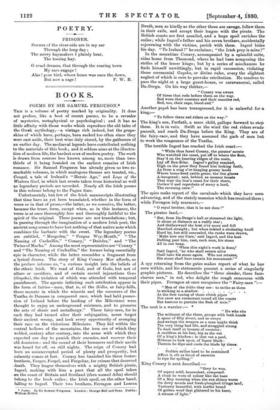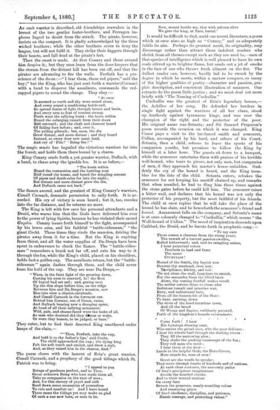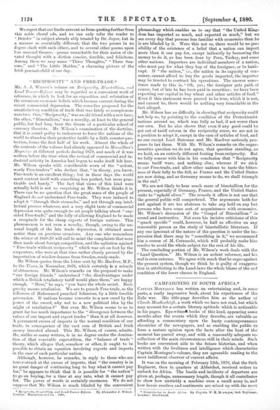BOOKS.
POEMS BY SIR SAMUEL FERGUSON.*
This is a volume of poetry marked by originality. It does not profess, like a host of recent poems, to be a revealer of mysteries, metaphysical or psychological ; and it has as little affinity with those works which reproduce the old tales of the Greek mythology,—a vintage rich indeed, but the grape- skins of which have, perhaps, been sucked too often since they were cast aside, their best wine duly stored, by the gatherers of an earlier day. The mediaeval legends have contributed nothing to the materials of this book; and it seldom aims at the illustra- tion of modern life, the hardest crux of modern poetry. The work is drawn from sources less known among us, more than two- thirds of it being founded on the earliest remains of Irish romance. Sir Samuel Ferguson has already given us two re- markable volumes, in which analogous themes are treated, viz., Conga/, a tale of Ireland's "Heroic Age," and Lays of the Western Gael, in which last events taken from historical as well as legendary periods are recorded. Nearly all the Irish poems in this volume belong to the Pagan time.
Unfortunately, but few of the Irish manuscripts illustrating that time have as yet been translated, whether in the form of verse or in that of prose,—the latter, as we conceive, the better, because the truer, form, except when, as in this instance, the verse is at once thoroughly free and thoroughly faithful to the spirit of the original. These poems are not translations ; but, in passing through the imagination• of a modern Irish poet, the ancient song seems to have lost nothing of that native note which combines the barbaric with the sweet. The legendary poems are entitled, " Mesgedra," " Fergus Wry-Month," " The Naming of Cuchullin," "Conary," " Deirdre," and " The Twins of Macha." Among the most representative are "Conary " and " The Naming of Cuchullin," the former being essentially epic in character, while the latter resembles a fragment from a lyrical drama. The story of King Conary Nor affords, as the preface informs us, " a curious insight into the beliefs of the ethnic Irish. We read of God, and of Gods, but not of altars or sacrifices, and of certain sacred injunctions Gesa (Gaysha), the violation of which was attended with temporal punishment. The agents inflicting such retribution appear in the form of fairies—men, that is, of the Sidhs, or fairy-hills, those mounts in which the wizards and the sorcerers of the Tuatha de Danaan (a conquered race, which had held posses- sion of Ireland before the landing of the Milesians) were thought to enjoy an underground existence, and to preserve the arts of ninsic and metallurgy." These fairy-men, for to such they had turned after their subjugation, never forgot their ancient wrong, and took every opportunity of avenging their race on the victorious Milesians. They hid within the central hollows of the mountains, the iron ore of which they welded, century after century, into the arms with which they expected one day to punish their enemies, and recover their old dominion ; and the sound of their hammers and their anvils was heard far off, on still nights. The reign of Conary had been an uninterrupted period of plenty and prosperity, but calamity comes at last. Conary has banished his three foster- brothers, Ferger, Fergel, and Fergobar, for crimes that deserved death. They league themselves with a mighty British pirate, Ingcel, making with him a pact that all the spoil taken en the coast of Britain and Scotland (then named Alba) should belong to the Irish exiles ; the Irish spoil, on the other hand, falling to Ingcel. Their two brothers, Ferragon and Lomna . Foam. By Slr Samuel Ferguson. London : George Bell and Sons. Dublin : William McGee.
Druth, men as kindly as the other three are savage, follow them in their exile, and accept their league with the pirate. The British coasts are first assailed, and a huge spoil enriches the exiles; while Ingcel's father and his seven brothers, accidentally sojourning with the victims, perish with them. Ingcel bides his day. " To Ireland !" he exclaims ; " the Irish prey is mine
In the meantime Conary, accompanied by a splendid suite, rides home from Thomond, where he had been composing the strifes of the lesser kings ; but by a series of mischances he finds himself unwittingly, but in rapid succession, violating those ceremonial Gaysha, or divine rules, every the slightest neglect of which is sure to provoke retribution. He resolves to pass the night at a large guest-house, or caravanserai, called Da-Derga. On his way thither,- "Conary was aware Of three that rode before them on the way. Red were their coursers and their mantles red, Red, too, their caps, blood-red."
Another gaysh has been transgressed, for it is • unlawful for a king,- " To follow three red riders on the way."
The king's son, Ferfiath, a mere child, gallops forward to stop them. It is in vain. Swift as the wind the red riders evade pursuit, and reach Da-Derga before the King. They are of the fairy-race, and they have assumed the garb of men but to work the vengeance of the Tuatha.
The terrible Ingcel has reached the Irish coast :—
"While thus fared Conary, the pirates' scouts Who watched the coast, put off to where the leek Stay'd on the heaving ridges of the main, Lay off Ben-Eder. Ingcel's galley reached, High on the prow they found him looking forth, As from a crag o'er-hanging grassy lands Where home-bred cattle graze, the lion glares A-hungered; and, behind, as meaner beasts That wait the lion's onset for their share, Outlaw'd and reprobate of many a land, The ravening crew."
The spies make report of the cavalcade which they have seem advancing, and of the stately mansion which has received them ; while Ferragon inly murmurs,-
" 0 royal brother, that it be not thou !" The pirates land,— " But, from Da-Derga's hall so streamed the light,
It shone at distance as a ruddy star ; And thitherward the host o'er moor and fell Marched straight ; but when behind a sheltering knoll
Hard by, but still concealed, the ranks were drawn,
Make now our Cern,' said Ingcel, and the host Defiling past him, cast, each man, his stone All in one heap.
When this night's work is done,' Said Ingcel, be who shall return alive Shall take his stone again. Who not retnrns, His atone shall here remain his monument.' "
A spy returning from the gates makes report of what he has seen within, and his statements present a series of singularly graphic pictures. He describes the " three slender, three face.
shaven men," in red, who delight the rough concourse with their pipes. Ferragon at once recognises the "Fairy-men ":—
" Men of the Sidhs they are : to strike at them
Is striking at a shadow At the first tuning of these elvish pipes Nor crow nor cormorant round all the coasts But hastens to partake the flesh of men."
The next is a warrior :—
" He who sits The midmost of the three, grasps with both bands A spear of fifty rivets, and so sways And swings the weapon as a man might think The very thing had life, and struggled strong To dash itself at breasts of enemies : A cauldron at his feet, big as the vat Of a king's kitchen; in that vat a pool, Hideous to look upon, of liquor black : Therein he dips and cools the blade by times. . . . . .
Sudden sallies hard to be restrained Affect it, oft as blood of enemies Is ripe for spilling."
King Conary is next described:— "Grey he was,
Of aspect mild, benevolent, composed. A cloak he wore of colour like the haze Of a May morning when the sun shines warm On dewy meads and fresh-ploughed tillage land, Variously beautiful, with border broad Of golden woof that glittered to his knee, A stream of light."
As each warrior is described, old friendships reawaken in the breast of the two gentler foster-brothers, and Ferragon im- plores Ingcel to desist from the attack. The pirate, however, insists on the compact. It is gladly acknowledged by the three wicked brothers ; while the other brothers scorn to deny the league, but will not fulfil it. They strike their daggers through their hearts, and fall dead at the pirate's feet.
Then the onset is made. At first Conary and those around him despise it ; but they soon learn from the door-keepers that the stream from the distant hill has been cut off, and that the pirates are advancing to fire the walls. Ferliath has a pre- science of the doom :—"1 fear them, these red pipers," said the boy;" but the King, who has just sent forth a warrior (Cormac) with a band to disperse the assailants, commands the red- capped pipers to sound the charge. They obey
At once
It seemed as earth and sky were sound alone,
And every sound a maddening battle-call, So spread desire of fight through breast and brain, And every arm to feat of combat strung.
Forth went the sallying hosts : the hosts within Heard the enlarging tumult from their doors Boll outward; and the clash and clamour heard Of falling foes before; and, over it, The yelling pibroch; but, anon, the din Grew distant, and more distant ; and they heard Instead, at every door new onset loud, And•ory. of 'Fire!" Bring fire !'"
The magic music has beguiled the victorious warriors far into the forest, and•holds them there bound by a charm.
King Conary sends forth a yet greater warrior, Dnftach, with S band, to chase away the ignoble foe. It is as before,—
" The hosts within
Heard the commotion and the hurtling rout Half round the house, and heard the mingling scream Of pipes and death-cries far into the night ; But distant and more distant grew the din, And Duftach came not back."
The flames ascend, and the greatest of King Canary's warriors, Canal' Carnach, demands permission to sally forth. It is ac- torded. His cry of victory is soon heard ; but it, too, recedes into the far distance, and he returns no more.
The King is left with few save his personal attendants and a Drnid, who warns him that the Gods have delivered him over to the power of lying Spirits, because he has violated their sacred Gaysha. Canary issues forth himself to the fight, accompanied by his brave sons, and his faithful " battle-sidesman," " the giant Cecht. Three times they circle the mansion, driving the pirates away from it for a time. But the King is expiring from thirst, and all the water supplies of Da-Derga have been spent in endeavours to check the flames. The " battle-sides- man " remembers a brook not far off, and cats his way to it through the foe, while the King's child, placed on his shoulders, holds fast a golden cap. The assailants return, but the " battle- sidesman " again dashes through them, and the child never loses his hold of the cup. They are near Da-Derga,—
" When, in the faint light of the growing dawn,
Casting his eyes to seaward, lo ! the fleet Of Ingcel had set sail ; and, gazing next Up the dim slope before him, on the ridge Betidreen him and Da-Derga's mansion, saw Rise into view a chariot-cavalcade, And Conall Carnach in the foremost car.
Behind him Cormac, son of Conor, came, And Daftaoh bearing now a drooping spear, At head of all their sallying armament. Wild, pale, and shame-faced were the looks of all, As men who doubted did they damn or wake, Or were they honest, to be judged, or base."
They enter,.bat to find their deserted King smothered under heaps of the slain,—
" Thou, Ferflath, take the cup, And hold it to thy father's lips,' said Cecht.
The child approached the cap ; the dying king Felt the soft touch and smiled, and drew a sigh, And, as they raised him in the chariot, died."
The poem closes with the lament of Erin's great warrior, Conan Carnach, and a prophecy of the good tidings which St.
Patrick was to bring.
"I appeal to you
Beings of goodness perfect, and to Thee, Great unknown Being who hest made them all, Take ye compassion on the race of men ;
And, for this slavery of gaysh and sidh
Send down some emanation of yourselves
To rale and comfort us ! And I have heard
There come the tidings yet may make us glad
Of such a one new born, or soon to be.
Now, mount beside me, that with solemn rites We give the king, at Tara, burial."
It would be difficult to find, amid our recent literature, a poem which at once aims as high as " Conary," and as adequately fulfils its aim. Perhaps its greatest merit, its originality, may discourage rather than attract those indolent readers who shrink from all themes except such as they are used to,—men of that species of intelligence which is well pleased to have its own coals stirred up to brighter flame, but sends out a jet of smoke in the face of one who throws fresh aliment on the fire. The dullest reader can, however, hardly fail to be struck by the degree in which he meets, within a narrow compass, so many of the higher qualities of poetry—character and passion, gra- phic description, and consistent illustration of manners. Our extracts do the poem little justice ; and we must deal yet more briefly with "The Naming of Cuchullin."
Cuchullin was the greatest of Erin's legendary heroes,— the Achilles of her song. He defended her borders in single fight against the warriors of all her clans, stood. up fearlessly against tyrannous kings, and was over the champion of the right and the protector of the poor. His original name was Setanta; and Sir Samuel Ferguson's poem records the occasion on which it was changed. King Conor pays a visit to the far-famed smith and armourer, Callan, accompanied by his bard, and others of his Court. Setanta, then a child, refuses to leave the sports of his companion youths, but promises to follow the King by himself at a later hour. The guests sit down to a banquet, while the armourer entertains them with praises of his terrible wolf-hound, who tears to pieces, not only men, but companies of men, if they approach his master's house unbidden. Sud- denly the cry of the hound is heard, and the King trem- bles for the fate of the child. Setanta enters, rebukes the armourer for not keeping his mastiff chained up, and remarks that when assailed, he had to fling him three times against the stone gates before he could kill him. The armourer raises a bitter wail, and declares that his hound was not only the protector of his property, but the most faithful of his friends. The child at once replies that he will take the place of the hound he has slain, and be henceforth the armourer's friend and hound. Amazement falls on the company, and Setanta's name is at once solemnly changed to "Cuchullin," which means "the Wolf-hound of Callan." The mood of inspiration descends upon Cathbad, the Druid, and he bursts forth in prophetic song:—
" To my ears
There comes a clamour from the rising years, The tumult of a torrent passion-swollen, Rolled hitherward ; and, mid its mingling noises, I hear perpetual voices Proclaim to laud and fame The name
CUCHULLIN
Hound of the Smith, thy boyish vow Devotes thy manhood, even now, T4pvigilance, fidelity, and toil: 'Tis not alone the wolf, fang-bare to snatch, Not the marauder from the lifted latch Alone, thy coming footfall makes recoil. The nobler service thine to chase afar Seditious tumult and intestine war, Envy, and =fraternal hate, From all the households of the State : To hunt, untiring, down The vices of the lewd-luxurious town, And all the brood
Of Wrong and Rapine, ruthlessly pursued, Forth of the kingdom's bounds exterminate.
• Come forth ! I hear His footsteps drawing near, Who smites the proud ones, who the poor delivers : I hear his wheels hurl through the dashing rivers : They fill the narrowing glen ; They shake the quaking causeways of the fen ; They roll upon the moor ;
I hear them at the door:—
Lands to the helpful Gods, the Hero-Givers, Here stands he, man of men !
Great are the words ho speaks ; They move through hearts of kindred!' and of nations.
At each clear sentence, the unseemly pallor Of fear's precipitate imaginations Avoids the bearded cheeks, And to their wonted stations
On every face
Return the generous, manly-mantling colour
And reassuring grace Of fixed obedience, discipline, and patience, Heroic courage, and protecting valour."
We regret that our limits prevent us from quoting further from this noble choral ode, and we can only refer the reader to '• Deirdre " (a subject already ably treated by Dr. Joyce, but in a manner so essentially different, that the two poems in no degree clash with each other), and to several other poems upon lass unusual themes,—poems remarkable for their union of ele- vated thought with a diction concise, forcible, and felicitous. Among these we may name "Three Thoughts," " Three Sea- sons," and " The Little Maiden," a charming picture of the Irish peasant-child of our day.




































 Previous page
Previous page